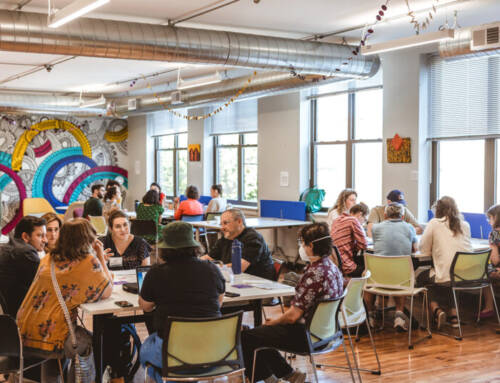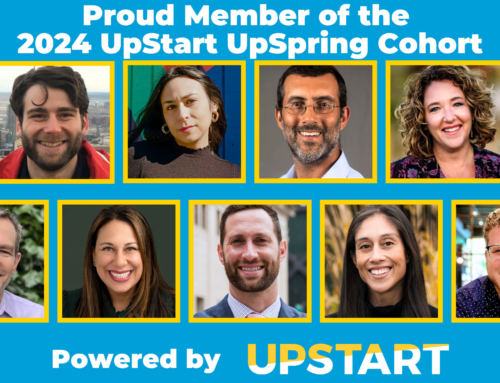December 29, 2017 | The Covenant Foundation
Tamir Barzilai is beta-testing an app so people with dietary restrictions can find restaurants in Vancouver offering dishes free of taboo ingredients. So far, the app has 500 subscribers, has earned extensive media coverage, and will soon go wider in Vancouver, and to other cities in Canada and the United States if all goes according to plan.
Barzilai, 23, is embracing purposeful product development to address a real need, beginning with his own, and is creating momentum with intensive research into the habits and preferences of his target population, and, perhaps most critically, active input from potential users throughout Vancouver.
His interpretation and practice of Design Thinking – a data-driven and user-generated approach to product, service and program development – is gaining increasing attention within Jewish communities challenged to find new ways to bolster engagement, participation and growth.
So it’s no surprise that with his Design Thinking nimbleness, Barzilai joined dozens of others like him last summer for a super-intensive brainstorming dive to generate boundary-busting ideas for building Jewish community in Vancouver.
This was a Jewish-focused “Hackathon,” a term and approach borrowed from the high-tech sector to describe a sprint-like marathon of ideas, creation and product development, and one that has bled into the non-tech world with increasing frequency.
The platform for such free-wheeling generation of ideas got a boost within the Jewish world last summer, when UpStart, the San Francisco-based incubator for Jewish community innovation, held three Hackathons – in Portland, Oregon; San Diego; and Vancouver. The Covenant Foundation supported the project with a Signature Grant as part of a slate of initiatives, this one in particular aimed to address challenges within the Jewish community in creative and novel ways.
“The Hackathons provided a deeply collaborative way to generate solutions to address community needs,” said Aaron Katler, UpStart’s CEO. “Using a Design Thinking approach, we partnered with forward-thinking institutions in these cities to engage their community members in creating innovative initiatives that enhance the vitality of Jewish life.”
In all, about 150 people across the spectrum of Jewish engagement, demographics, and affiliation participated in the three cities within the framework of UpStart’s Hackathon methodology, Design Thinking approach, and focus on social entrepreneurship to generate and build innovative solutions to a shared communal challenge.
Participants worked in groups to address the overarching issue of enhancing and growing Jewish community engagement. Pitches were made in an open forum before a panel of judges.
Observers, participants and others said the model is of critical, replicative importance in the Jewish community, where channels for such method-informed approaches to idea generation – practiced and proven in other sectors of society – are lacking.
“There is a void, but there are legitimate reasons for it,” said Jennie Starr, CEO and Founder of Startup18 in San Diego, which partnered with UpStart to develop the Hackathon there. “We are accustomed to institutionally based conversations in the Jewish community and for these institutions to drive goals and objectives. But there are those, especially Millennials and members of Generation Z, who are far less inclined to be joiners and institutionally impressed.
“Openness and free forming may not always be cultivated by established institutions, so the Hackathon is a reasonable means of encouraging, inspiring and publicizing an open door to new ideas and programs, and new voices and doers.”
Indeed, those who participated said they felt a palpable sense of empowerment as community visionaries and change makers. “This was a democratization of the idea generation process,” said Danielle Rugoff, 33, of San Diego. “Anyone, regardless of the space they work in or their professional level, can be heard and seen and have equal access to describe an idea. In the Jewish world, there are few if any platforms for anyone to become a leader even for a few minutes and be heard and seen and their ideas seriously considered.”
The three cities were chosen from more than 20 that applied, and the fact that they are all mid-sized Jewish communities on the West Coast underscores the value placed throughout the Hackathon initiative on amplifying voices often drowned out by more prominent and dense centers of North American Jewish life.
“One objective here is to bring methodologies and their outcomes to communities that are not considered hubs,” said Emily Winograd, Innovation Lead with UpStart, who managed the Hackathon initiative. “When people think of innovation, their mental image is often of a world premiere, never-before-seen idea. In fact, innovation is contextual. Bringing an effective and replicable model to a new market is also innovation.
“Plus, there is a value proposition beyond the ideas themselves, and that is in a process that is not top-down, but that mobilizes populations, giving them ownership and getting them engaged.”
From the three cities, eight ideas made it, including Makom, an intentionally non-institutionally based Jewish community for young adults in San Diego; Shalom PDX, an online and in-person welcoming portal for young newcomers to Portland; and Shmooz, a personalized app – generated by Barzilai – presenting Jewish events and opportunities for community-seeking Jews in the Vancouver area.
Each of the eight individuals or teams that emerged from the Hackathon received $2,500 in seed funding to further develop and accelerate their ideas within their communities and with local partners such as the Jewish Federation. They also came under UpStart’s incubating umbrella, providing them with an educational framework, online tools such as webinars and continuing mentorship.
“Typically, the pitfall to a Hackathon is that there is no follow-up,” Winograd said. “Someone can start a multi-million dollar venture afterwards, or at the other extreme, nothing at all happens. By providing the seed money, connections, and entrepreneurial training, we want to help ensure that these good ideas stick and go somewhere.”
So Rugoff, whose Makom project was one of the winning proposals in the San Diego Hackathon, is now using advanced Design Thinking methodologies to refine her idea based on input from potential constituencies, and she is moving to beta test some events and experiences to measure preferences and in her words, “observe like any smart entrepreneur would in a high-stakes business.”
Barzilai, too, is at a data-collection stage, having created an online bot to build a base of potential users for his Jewish community app and determine the type of information and interaction they might want from it.
“The Hackathon is a great initiative and it’s a great idea to bring it into the Jewish community, but it’s not the magic bullet solution to every challenge,” he said. “It takes a lot to reach success.
“The promise here is that we are being given the tools and the support and the room to adapt, and that is rare in this environment. And the fact that all of us are helping our own community and addressing our own needs, this is a huge step in making our ideas more successful.”
By H. Glenn Rosenkrantz, for The Covenant Foundation
Our purpose is to enable entrepreneurs to bring bold Jewish ideas to light. We help them reach Up to people in new ways that are meaningful, more inclusive, and create a brighter future for our Jewish community and the world we share.




